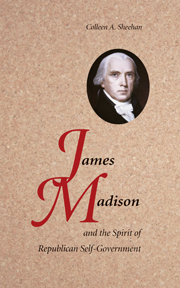Book contents
- Frontmatter
- Contents
- Acknowledgments
- List of Abbreviations for Sources
- Preface
- Introduction: Madison's Legacy
- 1 Republican Opposition
- 2 The Federalist Agenda
- 3 Madison and the French Enlightenment
- 4 The Commerce of Ideas
- 5 The Politics of Public Opinion
- 6 Madison and Jefferson: An Appeal to the People
- 7 The Spirit of Republican Government
- Epilogue: The Philosopher's Stone and the Poet's Reprise
- Bibliography
- Index
- References
Epilogue: The Philosopher's Stone and the Poet's Reprise
Published online by Cambridge University Press: 05 June 2012
- Frontmatter
- Contents
- Acknowledgments
- List of Abbreviations for Sources
- Preface
- Introduction: Madison's Legacy
- 1 Republican Opposition
- 2 The Federalist Agenda
- 3 Madison and the French Enlightenment
- 4 The Commerce of Ideas
- 5 The Politics of Public Opinion
- 6 Madison and Jefferson: An Appeal to the People
- 7 The Spirit of Republican Government
- Epilogue: The Philosopher's Stone and the Poet's Reprise
- Bibliography
- Index
- References
Summary
When John F. Kennedy stood on the Capitol steps and took the oath of office as the thirty-fifth president of the United States on that hoary January day, America had only fifteen years before defeated the greatest external threat to freedom the Western world had yet known. By 1961, with the advances in military technology and the increasing threats associated with the Cold War, the world had become a different and a more dangerous place since America's birth in 1776. “Yet,” Kennedy said, paraphrasing the words of Jefferson, “the same revolutionary beliefs for which our forebears fought are still at issue around the globe – the belief that the rights of man come not from the generosity of the state, but from the hand of God. We dare not forget today that we are the heirs of that first revolution.” And “let every nation know,” Kennedy continued, “that we shall pay any price, bear any burden, meet any hardship, support any friend, oppose any foe, in order to assure the survival and the success of liberty.”
Almost a half-century later, with technology keeping stride with the passage of time, our world is now an even more dangerous place. The Cold War may be over, but the threats to freedom and the burden that must be borne by its defenders have not lessened.
- Type
- Chapter
- Information
- James Madison and the Spirit of Republican Self-Government , pp. 176 - 184Publisher: Cambridge University PressPrint publication year: 2009



